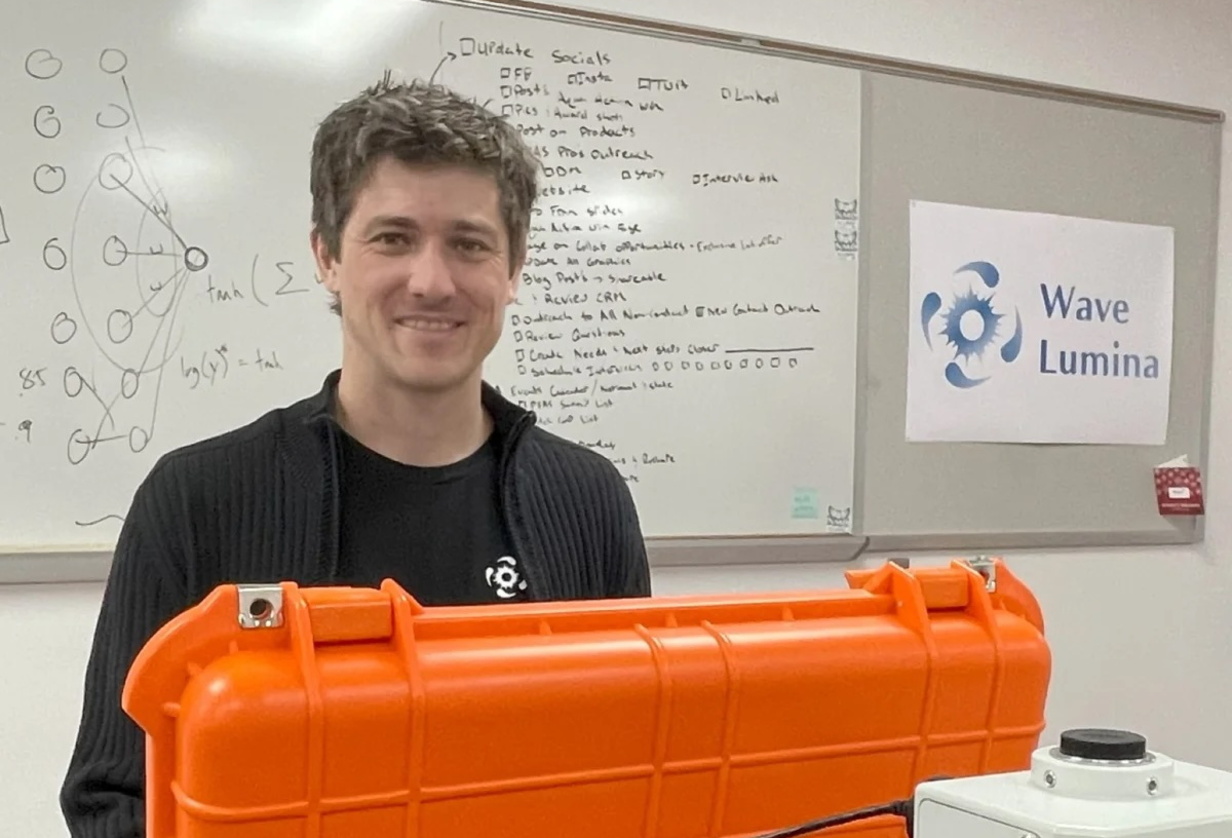
This Traverse City-Based Startup Wants To Revolutionize PFAS Testing
By Craig Manning | Aug. 24, 2025
September 12 marks the official groundbreaking for Traverse City’s long-gestating Freshwater Research and Innovation Center. And while that hub isn’t slated to open its doors until spring 2027, Vernon LaLone already has his sights set on becoming one of the center’s first business tenants.
LaLone is the founder of Wave Lumina, a local startup working to develop a revolutionary portable field sensor technology that would make it easier for environmental professionals to detect PFAS in water. Established just two years ago, the company is in the midst of a big, big summer, with a six-figure grant from the National Science Foundation (NSF) and acceptance into a prestigious entrepreneurial fellowship program.
Wave Lumina learned in June that it had been awarded $305,000 from NSF’s Small Business Innovation and Research (SBIR) program. SBIR grants are intended to spur “use-inspired research and development of unproven, leading-edge, technology innovations that address societal challenges,” and are “non-dilutive,” meaning founders don’t have to give up equity in exchange for funding.
“It’s a big a chunk of money that will be used to prove out the core science that underlies our technology,” LaLone explains of the grant. “We're building something that does not currently exist, and a big part of that process is just proving that the technology works. So, it’s a 12-month grant, and it really supports us and our laboratory R&D operations. It pays the salaries of the folks that are working on the technology development, and it also has a business market analysis portion that helps us understand the techno-economic landscape that the tool we're building fits into.”
LaLone says the $305,000 is just “phase one” of what could become a broader relationship between Wave Lumina and NSF.
“Our goal for the 12 months of the grant is to get to a point where we can secure a phase two SBIR award,” LaLone tells The Ticker. “That's a lot more money over a longer period of time, and it's much more geared toward scaling up the business and commercializing the product.” Only companies that have secured phase one SBIR grants can apply for phase two funding.
LaLone says he’s “always done analytical chemistry to support folks who are making things,” which led to the pharmaceutical industry after grad school – and eventually, to the TC-based Cambium Analytica. There, LaLone became familiar with industry pain points around PFAS testing.
“I was shocked how much people were willing to pay for PFAs lab tests,” LaLone explains. “It can take weeks for labs to actually turn around these results. I thought, ‘There's got to be an easier way to do this, where people can do these tests on site, in real time.’ Recognizing that opportunity inspired me to take my chemistry experience and translate it from the pharmaceutical application to solving an environmental problem.”
The Wave Lumina technology uses a technique called surface-enhanced Raman spectroscopy to test water samples for PFAS.
“Basically, we've got these little test strips that have nanoparticles on them, and then we've also got a sample prep kit,” LaLone explains. “So, you mix some reagents with your water sample, shake it up, and then put some it on the test strip. The strip then goes into our little handheld device, which also has a software component to it.”
If it works, the tool will open the door for environmental professionals to test for PFAS in the field and get near-instantaneous results, rather than sending samples back to the lab and waiting for a verdict.
The NSF isn’t the only party that sees promise in the idea. Last year, Wave Lumina won second place in AquaHacking Challenge, which Northwestern Michigan College (NMC) cohosted along with the water-focused nonprofit AquaAction. NMC is now renting lab space to Wave Lumina at the Parsons-Stulen Building.
Also this summer, LaLone and Wave Lumina were accepted into Activate, a nonprofit national entrepreneurial fellowship program that provides members with two years of support. That support includes “a yearly living stipend of $100,000, plus travel allowance, health insurance, and relocation,” according to the Activate website, as well as an additional $100,000 in non-dilutive R&D funds. Other perks include virtual classes focused on essential business knowledge, as well as networking connections “with the entire Activate community,” which includes current and past fellows, investors, advisors, and legal experts.
LaLone is hopeful Wave Lumina’s winning streak will continue. He’s waiting to hear back about a Department of Defense (DoD) grant. “They've got a program called the Strategic Environmental Research and Development Program, and that program funds a ton of PFAS remediation technologies,” LaLone says of the DoD.
Wave Lumina is also “lining up on-site pilots” for 2026, LaLone says, “where our team will go out and work with customers on their projects, performing PFAS tests in real time on site.” The goal is that the company’s PFAS testing solution could hit the market in 2027 – the same year the Freshwater Research and Innovation Center opens.
“So, I hope that we can occupy the Freshwater Research and Innovation Center when it opens,” LaLone says. “It really depends on the timing and the stage that we're at by then, so only time will tell. But eventually, we're going to outgrow this little 600-square-foot lab space that we rent from NMC right now, and the center sounds like it will be a great community resource.”
Comment






